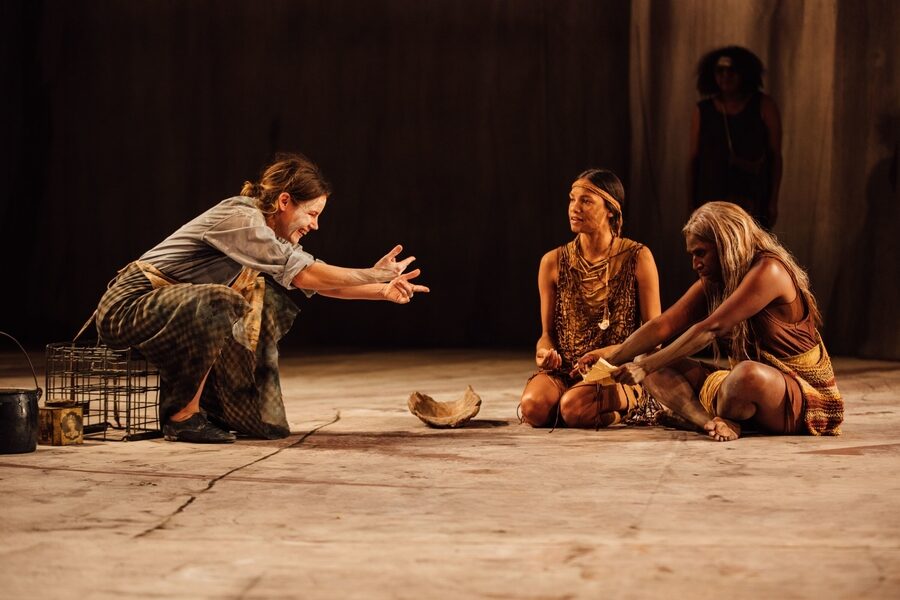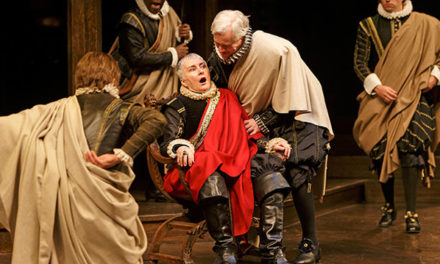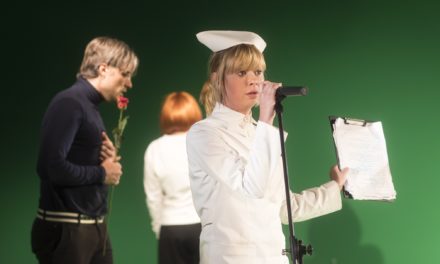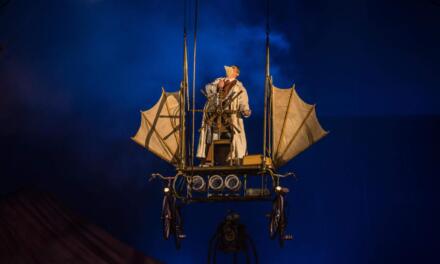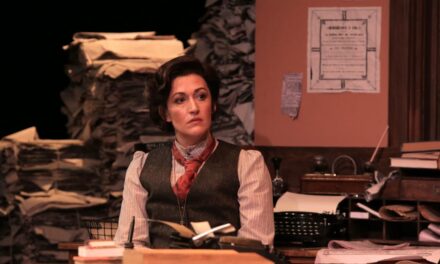The revival of Sydney Theatre Company’s production of The Secret River, performed to great acclaim since 2013, was presented to London audiences at the Olivier stage of the National Theatre between 23 August and 7 September 2019. Adapted by Andrew Bovell from Kate Grenville’s lauded novel of the same title, and directed by Neil Armfield, the production unearths uncomfortable realities of the settlement of Australia. Truths, which the Commonwealth’s collective consciousness attempted to bury beneath claims of inhabiting the continent under the doctrine of terra nullis. Bringing the production to London is of vital significance – in the second half of the eighteenth century, the overcrowded capital was more than eager to populate colonial transport ships with its unwanted citizens: its poor, its unemployed and its convicts.
The characters of Sal (Georgia Adamson) and William Thornhill (Nathaniel Dean), together with their two young sons Willie (Rory Potter) and Dick (Toby Challenor), are fictional variations on expats that arrived on these very vessels. They are introduced as Sal reads out a pardon for her illiterate husband, marking a divide that will permeate their relationship throughout the play. Consumed with homesickness, she sees Will’s regained freedom as an opportunity to go back to England. He, however, associates England only with poverty, which pushed him to crime. In New South Wales he sees an opportunity to transcend his past life, free from the chains of his social class. And he considers land ownership as a means to achieve it.
THORNHILL: There’s a piece of land I seen up there. Had my eye on it in the past year. (…) We should get it before some other bugger does.
SAL: Get it! What do you mean, get it?
THORNHILL: Blackwood says you just need to plant your backside somewhere and leave it there long enough and it’s yours.
SAL: You’re a fool if you think something comes that cheap.
THORNHILL: There’s others done it. Grabbed a piece. Put in a crop to say it’s theirs. Even given it their name.
Thornhill, like other settlers portrayed in the play, fails to see that the land is not free to take. His lack of education and his social background hinders his perception of the indigenous Dharug people as actual inhabitants of the riverbank where he chooses to settle.
The portrayal of Aboriginal Australians in the adaptation is a significant departure from Grenville’s novel. The original narrative offers little in way depiction (though speaks volumes on the colonial mindset), mentioning locals mostly as seen in the distance, filtered through the perception of white immigrants. This dissociation feels a necessity of the form; being a work of a single (white) author, speaking on behalf of the oppressed bares risks of further appropriation. Theatre, as a collaborative medium, allows for these voices to be heard. In this case, through a considerately assembled cast and incorporation of native tongues, songs and rituals into the performance. The Dharug people of the play speak in their language, and Armfield trusts and respects us enough as audience members to let us hear them unaided by subtitles.
Any potential language barriers are lifted through astute dramatization. In the first act, the Thornhill family is anxious about the presence of the tribe. In one of the scenes, William sets off to confront them and to ask them to leave “his” land. It’s quite apparent, however, that his camp is set on grounds used by the Dharug to cultivate food and they share entirely parallel concerns. A brilliantly comical display ensues, in which he asks the elder, Yalamundi (Major Sumner AM), how long they intend to stay. The struggle to communicate is marked by the use of repetition and expressive gesturing. It quickly becomes apparent the tribe believes Thornhill to declare his intention to withdraw. But each party hears what they wish to hear, for each sees the other as a temporary trespasser who needs to be tolerated.
The production also shows language as a tool of dominance. The settlers, intimidated by names they deem unpronounceable, begin reshaping Dharug identities to make them more “practical.” And thus for Will, the warrior Ngalamalum (Shaka Cook) becomes Jack, while Sal in her trades with matrons Buriya (Elma Kris) and Gilyagan (Dubs Yunupingu) redubs them as Meg and Polly. Such interactions are rendered with remarkable sensitivity. The Thornhills are not ruthless, exploitative, and cynical colonizers. They are merely incapable of relativizing their perspective. Towards the end of the first act, William and his older son arrive at Sydney Harbour to collect a convict for work at their camp. As it transpires, among the conflict is Dan Oldfield (Joshua Brennan), a childhood friend of Will’s. Before he can be taken, Thornhill is reminded by Captain James Suckling (Matthew Sunderland) of his social rank.
SUCKLING: Stand back, for God’s sake, man. You harbour the flies so! (…) You here for one of these?
THORNHILL: That’s right, sir. Got my pardon. Own land now.
SUCKLING: Is that so? A gentleman you pretend to be. Well, a gentleman takes a bath once a week, Thornhill. (…) What’s your name, boy?
WILLIE: Willie Thornhill.
SUCKLING: Wille Thornhill what? (…)
THORNHILL: You’ll address Captain Suckling as sir.
WILLIE: I’m Willie Thornhill, sir.
SUCKLING: Well, Master Thornhill, remember this. You’re the son of a common thief. And you always will be… Take your pick, man. Feel free, won’t you? (…)
DAN: Will Thornhill, is it? Will! It’s Dan Oldfield, remember? (…) It’s good to see you, Will. The Old Place sends its regards. The river ain’t the same without our Will Thornhill.
THORNHILL: Forgetting your manners, are you, Dan Oldfield? (…) It is Mr Thornhill now… You would do well to remember that.
This brief exchange is a carefully crafted exemplification of how British colonists seeking a “new life” build it using unstable foundations that toppled their past roosts. The only society that can be erected is based on competition and segregation. Their uncouthness and fear of “The Other” ultimately leads the conflict with natives to escalate. The character of Smasher Sullivan (a louring Jeremy Sims), also an ex-convict, catalyzes this. He is a crafty firebrand, deliberately falsifying accounts of events and projecting his transgressions onto the denizens of the Eastern Coast. Though reviled by his peers, his demagoguery unites them against a common “threat” and fills the surrounding waters with Aboriginal blood.
The story is set around the winding stream of a river locally known as Dhirrumbin, which colonizers called the Hawkesbury. The production gives this watercourse an embodied presence in the guise of a narrator, for years portrayed by Ningali Lawford-Wolf, who tragically passed away during The Secret River’s prior run in Edinburgh. In the London season, the part is gracefully read by Pauline Whyman. Her effort in taking on this task at short notice, undoubtedly painful and heartfelt for her and the acting company, is nothing short of admirable. And as the part is read, it gives a deep feeling of absence and loss; it serves as a tribute to an unreplaceable spirit.
Stephen Curtis’ set is minimalistic, with an almost bare stage exposed against a backdrop resembling sandstone, and avoids the trappings of a naturalistic period piece. The world presented is brought to life with faith in theatrical make-believe, aided by Mark Howett’s dramatic lighting and composer Iain Grandage’s live accompaniment. The music draws on traditional Dharug songs, as well as tunes long-established in England (such as Oranges and Lemons or Little Fish), and bound with the events depicted in the production sacralizes them into a ritualistic experience. Streaks of white coloring covering the settlers’ bodies and black paint marking the figures of Aboriginal characters accentuate the discord between them. Tess Schofield’s costumes are cleverly anachronistic; neither epochal nor contemporary, they circumvent imaging a distancing past. For it’s a past that heavily informs our present. And while the production showed it’s a conversation that remains difficult for Australia, its arrival in London is also a reminder that the United Kingdom should be part of it. While it is reassuring that this dialogue is taking place on the stage of The National Theatre, there’s little hope that it will aid decisions made in Westminster, only a short distance away across the Thames. Bitterly, performed on this turf The Secret River illuminates modern Britain’s disquietude with immigration as perhaps rooted in its history of extraterritorial violence.
The Secret River
Adapted by Andrew Bovell from the novel by Kate Grenville
Directed by Neil Armfield
With Georgia Anderson, Joshua Brennan, Toby Challenor, Shaka Cook, Marcus Corowa, Nathaniel Dean, Issac Hayward, Melissa Jaffer, Elma Kris, Pauline Whyman, Dylan Miller, Colin Moody, Jacob Narkle, Wesley Patten, Rory Potter, Jeremy Sims, Bruce Spence, Major Sumner AM, Matthew Sunderland, Dubs Yunupingu
Stage design by Stephen Curtis
Lighting Design by Mark Howett
Music by Iain Grandage
Dramaturgy by Matthew Whittet
Sydney Theatre Co. at National Theatre (London), August 23 – September 7, 2019
Seen on August 28, 2019
This post was written by the author in their personal capacity.The opinions expressed in this article are the author’s own and do not reflect the view of The Theatre Times, their staff or collaborators.
This post was written by Konrad Zielinski.
The views expressed here belong to the author and do not necessarily reflect our views and opinions.

